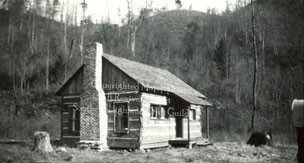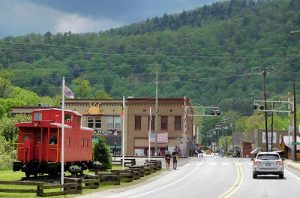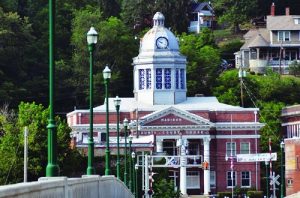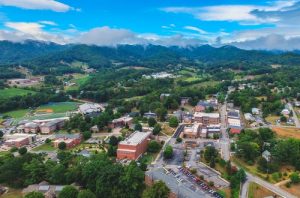The road is marked with a state Historic Marker reading Frances Goodrich. Yale educated (although at the time she attended, the school only granted certificates of attendance to women), when she came to the Asheville area in 1890 to work with a Presbyterian Church mission, Goodrich was already interested in mountain crafts. When a neighbor woman brought her a gift of a double bow knot coverlet, her interest grew—especially since the woman has also given her the pattern’s draft which described how to make it. Goodrich wondered if a business could be developed to produce and market—thus preserving—these coverlets at an affordable cost. Her role in this process was to change weaving from a one-family operation to a community operation, enabling more people to benefit economically. And, it was only natural that the work would expand to smaller products such as table runners and other decorative pieces that might be easier to market.
When she moved to the Laurel County in 1897, she established a weaving cooperative, Allanstand Cottage Industries (named for the location). Here she paid women to weave in their homes and purchased work piece by piece. The location was a historic “stand” (owned by a man named Allan) for drovers to stop for the night while taking their livestock from farm to market. And, so it was natural that it would continue as a gathering place but in this instance, a gathering place for mountain craftspeople. Not only did she want to preserve the traditional handicraft and its heritage, Frances Goodrich’s vision was that the communities have both economic self-reliance AND interdependence. To ensure the economic success, the products had to be sold beyond the local area and Goodrich expanded into mail orders—filling orders from all over including one in 1913 from Ellen Wilson at the White House.

The business thrived in Madison County, and in 1908 Goodrich relocated Allanstand to downtown Asheville. Eventually, in 1928, she and others (including Olive Campbell of the John C. Campbell Folk School) founded the Southern Highland Handicraft Guild and gave Allanstand to the Guild as their shop In 1935 she enhanced that gift with a donation of a collection of regional crafts that is the cornerstone of today’s Southern Highland Craft Guild permanent collection. Allanstand Craft Shop is now located at the Folk Art Center at milepost 382 on the Blue Ridge Parkway. Today the Guild (with almost 1000 juried craftspeople from nine southeastern states) is second in age only to the Boston Society of Arts and Crafts. And, it all started with an idea and the energy of Frances Goodrich and her Allanstand Cottage Industries.



